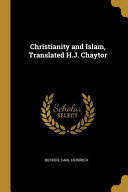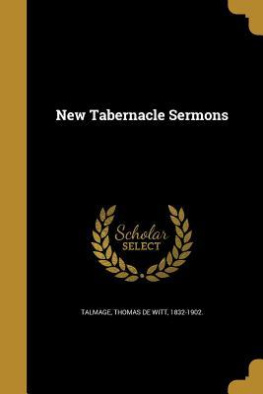The Project Gutenberg EBook of Christianity and Islam, by C.H. Becker
This eBook is for the use of anyone anywhere at no cost and withalmost no restrictions whatsoever. You may copy it, give it away orre-use it under the terms of the Project Gutenberg License includedwith this eBook or online at www.gutenberg.org
Title: Christianity and Islam
Author: C.H. Becker
Release Date: February 20, 2004 [EBook #11198]
Language: English
*** START OF THIS PROJECT GUTENBERG EBOOK CHRISTIANITY AND ISLAM ***
Produced by Luiz Antonio de Souza and PG Distributed Proofreaders
CHRISTIANITY
AND
ISLAM
BY
C.H. BECKER, PH.D.
PROFESSOR OF ORIENTAL HISTORY INTHE COLONIAL INSTITUTE OF HAMBURG
TRANSLATED BYREV. H.J. CHAYTOR, M.A.
HEADMASTER OF PLYMOUTH COLLEGE
1909
TABLE OF CONTENTS
The subject from different points of view: limits of treatment
The nature of the subject: the historical points of connection between
Christianity and Islam
A. Christianity and the rise of Islam:
1. Muhammed and his contemporaries
2. The influence of Christianity upon the development of Muhammed
3. Muhammed's knowledge of Christianity
4. The position of Christians under Muhammedanism
B. The similarity of Christian and Muhammedan metaphysics during the
middle ages:
1. The means and direction by which Christian influence affected
Islam
2. The penetration of daily life by the spirit of religion; asceticism, contradictions and influences affecting the development of a clerical class and the theory of marriage
3. The theory of life in general with reference to the doctrine
of immortality
4. The attitude of religion towards the State, economic life,
society, etc.
5. The permanent importance to Islam of these influences: the
doctrine of duties
6. Ritual
7. Mysticism and the worship of saints
8. Dogma and the development of scholasticism
C. The influence of Islam upon Christianity:
The manner in which this influence operated, and the explanation of the superiority of Islam
The influence of Muhammedan philosophy
The new world of European Christendom and the modern East
Conclusion. The historical growth of religion
Bibliography
CHRISTIANITY AND ISLAM
A comparison of Christianity with Muhammedanism or with any otherreligion must be preceded by a statement of the objects with whichsuch comparison is undertaken, for the possibilities which lie in thisdirection are numerous. The missionary, for instance, may considerthat a knowledge of the similarities of these religions would increasethe efficacy of his proselytising work: his purpose would thus bewholly practical. The ecclesiastically minded Christian, alreadyconvinced of the superiority of his own religion, will be chieflyanxious to secure scientific proof of the fact: the study ofcomparative religion from this point of view was once a popular branchof apologetics and is by no means out of favour at the present day.Again, the inquirer whose historical perspective is undisturbed byecclesiastical considerations, will approach the subject with somewhatdifferent interests. He will expect the comparison to provide him witha clear view of the influence which Christianity has exerted uponother religions or has itself received from them: or he may hope bycomparing the general development of special religious systems to gaina clearer insight into the growth of Christianity. Hence the object ofsuch comparisons is to trace the course of analogous developments andthe interaction of influence and so to increase the knowledge ofreligion in general or of our own religion in particular.
A world-religion, such as Christianity, is a highly complex structureand the evolution of such a system of belief is best understood byexamining a religion to which we have not been bound by a thousandties from the earliest days of our lives. If we take an alien religionas our subject of investigation, we shall not shrink from theconsequences of the historical method: whereas, when we criticiseChristianity, we are often unable to see the falsity of thepre-suppositions which we necessarily bring to the task of inquiry:our minds follow the doctrines of Christianity, even as our bodiesperform their functionsin complete unconsciousness. At the same timewe possess a very considerable knowledge of the development ofChristianity, and this we owe largely to the help of analogy.Especially instructive is the comparison between Christianity andBuddhism. No less interesting are the discoveries to be attained by aninquiry into the development of Muhammedanism: here we can see thegrowth of tradition proceeding in the full light of historicalcriticism. We see the plain man, Muhammed, expressly declaring in theQoran that he cannot perform miracles, yet gradually becoming amiracle worker and indeed the greatest of his class: he professes tobe nothing more than a mortal man: he becomes the chief mediatorbetween man and God. The scanty memorials of the man become voluminousbiographies of the saint and increase from generation to generation.
Yet more remarkable is the fact that his utterances, his logia, ifwe may use the term, some few of which are certainly genuine, increasefrom year to year and form a large collection which is criticallysifted and expounded. The aspirations of mankind attribute to him suchwords of the New Testament and of Greek philosophers as wereespecially popular or seemed worthy of Muhammed; the teaching also ofthe new ecclesiastical schools was invariably expressed in the form ofproverbial utterances attributed to Muhammed, and these are nowwithout exception regarded as authentic by the modern Moslem. In thisway opinions often contradictory are covered by Muhummed's authority.
The traditions concerning Jesus offer an analogy. Our Gospels, forinstance, relate the beautiful story of the plucking of the ears ofcorn on the Sabbath, with its famous moral application, "The Sabbathwas made for man, and not man for the Sabbath." A Christian papyrushas been discovered which represents Jesus as explaining the sanctityof the Sabbath from the Judaeo-Christian point of view. "If ye keepnot the Sabbath holy, ye shall not see the Father," is the statementin an uncanonical Gospel. In early Christian literature, contradictorysayings of Jesus are also to be found. Doubtless here, as inMuhammedan tradition, the problem originally was, what is to be myaction in this or that question of practical life: answer is given inaccordance with the religious attitude of the inquirer and Jesus andMuhammed are made to lend their authority to the teaching. Traditionalliterary form is then regarded as historical by later believers.
Examples of this kind might be multiplied, but enough has been said toshow that much and, to some extent, new light may be thrown upon thedevelopment of Christian tradition, by an examination of Muhammedanismwhich rose from similar soil but a few centuries later, while itstraditional developments have been much more completely preserved.
Such analogies as these can be found, however, in any of theworld-religions, and we propose to devote our attention moreparticularly to the influences which Christianity and Islam exerteddirectly upon one another. While Muhammedanism has borrowed from itshereditary foe, it has also repaid part of the debt. By the very factof its historical position Islam was at first indebted toChristianity; but in the department of Christian philosophy, it hasalso exerted its own influence. This influence cannot be compared withthat of Greek or Jewish thought upon Christian speculation: Christianphilosophy, as a metaphysical theory of existence, was howeverstrongly influenced by Arabian thought before the outset of theReformation. On the other hand the influence of Christianity uponIslamand also upon Muhammed, though he owed more to Jewishthoughtwas so extensive that the coincidence of ideas upon the mostimportant metaphysical questions is positively amazing.
Next page


